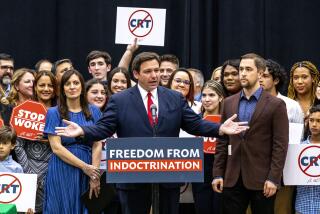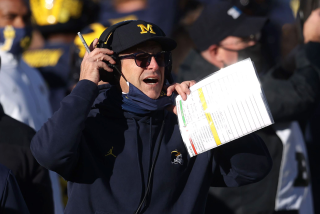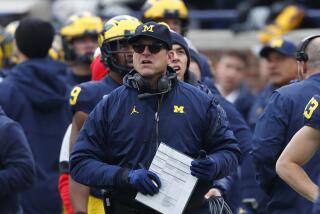Massachusetts Grades Controversy Is Becoming a Study in Motivation
- Share via
AMHERST, Mass. — College basketball teams often pick up a cause in the course of a season. Something to bring the players closer, something coaches can use as a motivational tool as the NCAA tournament approaches.
When Arkansas won last season’s national championship, Nolan Richardson and his Razorbacks spoke about what they perceived to be a lack of respect. In their minds, it didn’t come until they had beaten Duke in the NCAA final.
Massachusetts is trying to become this season’s Arkansas on the court, and the fifth-ranked Minutemen have taken on a similar us-against-the-world persona. It has nothing to do with the perception of them as players, though, but as students.
“I don’t think in any way you can look at something like this and say it was good that it happened,” Massachusetts Coach John Calipari said in his office Tuesday afternoon. “But dealing with adversity proves whether or not you’re a champion.”
Calipari was referring to the controversy that has followed the Minutemen since mid- October. Four days after the start of practice, the Boston Globe reported that four of the team’s players, including three starters, were on academic probation for having an overall grade-point average of 2.0 or less. Two others, the Globe reported, were on academic warning because their GPAs were below 2.0 last spring.
The report -- which has been quietly yet aggressively disputed by university officials and questioned by the high school coach of at least one of the players -- has become the unwanted focus of the 1994-95 season for Calipari and his players.
It has followed them 15 miles down the interstate to Springfield, where Massachusetts beat then-top-ranked Arkansas in the season-opening Tip-Off Classic. It followed them Saturday to Anaheim, where the then-No. 1 Minutemen lost to seventh-ranked Kansas in the John Wooden Classic.
And it will follow them to the Baltimore Arena, where today Massachusetts takes on No. 11 Maryland in a nationally televised game between two familiar rivals. Undoubtedly, it will follow the Minutemen the rest of the season.
“I don’t think it’s over,” said Calipari, who, because of privacy laws and an internal university investigation into how the information was obtained, declined to comment on the specifics of the report. “But if a person has any knowledge of college athletics, this could have been done anywhere. It’s part of being successful and coming from where we did to where we are now. I’ve had friends call me and say, ‘Welcome to college basketball.’
“My problem was how they embarrassed the kids. I told the kids, ‘It’s not about you, it’s about me.’ I stand by my record. The six kids who were highlighted in the piece, I believe all six kids will graduate. It’s been painted in a way that I don’t think is true. Once a perception is there, it’s hard to break. But I think this program and my record will stand the test of time.”
Calipari, 35, isn’t talking about his 131-65 record in six-plus seasons at Massachusetts. He isn’t talking about the three straight Atlantic 10 regular-season and postseason championships, the five postseason appearances that include three straight NCAA tournament bids or the trip to Sweet 16 in 1992. He isn’t talking about the first No. 1 ranking, however short-lived, in school history.
What he is talking about is this:
-- That a survey by the NCAA reported earlier this year showed a 75 percent graduation rate at UMass.
-- That the first of three Prop 48 players he recruited, Kennard Robinson, graduated in four years.
-- That starting point guard Derek Kellogg is a two-time academic all-conference performer as a real estate and finance major, something that wasn’t reported by the Globe.
“It’s a shame that the whole picture wasn’t shown, just one snapshot of a 24-exposure,” Kellogg said this week. “I see how hard these guys work in study halls.”
That snapshot has led to other national media outlets criticizing Massachusetts for the job it has done educating the basketball team. Sports Illustrated chastised Calipari for being a highly paid self-promoter in a column titled “UMess.”
It has led Massachusetts to take what sophomore center Marcus Camby called “an us-against-the world attitude, like Arkansas had last season.” Senior forward Lou Roe, the team’s floor leader, said: “It’s definitely brought the team closer together. It’s time to circle the wagons and depend on each other, because that’s all we have right now. We want to prove everyone wrong whether it’s on the basketball court or in the classroom.”
To that end, the Minutemen reportedly held a players-only meeting last month and set a goal for a team GPA of 2.5 or better for this semester. Though Calipari denies that the Globe story had anything do with his closing practice for a couple of weeks at the start of the season, there was definitely a bunker mentality for a while. Calipari since has reopened practice to the media, but has not let down his guard.
“They made a commitment to having a good term academically before any of this came out,” said Calipari, who handed down a three-game suspension to one of his starters, guard Mike Williams, for poor classroom attendance past spring. “But you don’t help these kids by publicly humiliating them. Kids who come in here from a tough academic background and graduate with a 2.0, that’s quite an accomplishment. They might be the first person in their family to graduate from college. Their getting a 2.0 is like a suburban kid coming here and getting a 4.0.”
University officials are among Calipari’s staunch defenders, pointing out that the program was not only in disarray on the court when he was hired in 1988, but off the court as well. The NCAA survey backed that up, reporting that Calipari’s predecessor, Ron Gerlufsen, failed to graduate a single player during his coaching tenure. The Minutemen had a stretch of 10 11 straight losing years that included Calipari’s first season.
Said university president Michael Hooker: “I think he (Calipari) will come out of this OK. He has something to prove. He’s not going to be embarrassed. John is very good at his job.”
Hooker, who has been president of the University of Massachusetts system since 1992, said that the Globe likely would not have written the story “had we not been a successful program.” But Hooker, who served as president of the University of Maryland Baltimore County for seven years, added: “You live by the sword, you die by the sword. If you use the positive publicity to attract students, you have to suffer public scrutiny and learn to accept it.”
That doesn’t mean Hooker believes what the Globe wrote was either fair or accurate. While he and other university officials decline to talk about possible discrepancies between the players’ transcripts and what was reported, the high school coach of junior forward Dana Dingle called a New York radio station to say that he saw the player’s transcript and his grades last semester were well above university standards.
“If it happened in January, something like that could wreck a season,” said Calipari. “The fact that it happened so early, it happened at a good time -- if there is ever a good time.”
Maybe it will bring the Minutemen closer together. Maybe Calipari, if he hasn’t already, will use it to motivate his players when they have a bad game. And maybe, just maybe, it will become the cause on which this season’s national championship is built.
More to Read
Go beyond the scoreboard
Get the latest on L.A.'s teams in the daily Sports Report newsletter.
You may occasionally receive promotional content from the Los Angeles Times.










